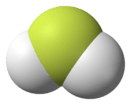Fluoronium
 | |||
| |||
| Names | |||
|---|---|---|---|
| IUPAC name
Fluoronium | |||
| Systematic IUPAC name
Fluoranium[1] | |||
| Identifiers | |||
| ChEBI | CHEBI:50314 | ||
| ChemSpider | 19122106 | ||
| |||
| Jmol-3D images | Image | ||
| |||
| Properties | |||
| H2F+ | |||
| Molar mass | 21.01428 g mol−1 | ||
| Except where noted otherwise, data is given for materials in their standard state (at 25 °C (77 °F), 100 kPa) | |||
| | |||
| Infobox references | |||
Fluoronium (systematically named fluoranium, and μ-fluorido-dihydrogen(1+)) is an inorganic cation with the chemical formula H
2F+
(also written [H
2F]+
). It contributes no colour to fluoronium salts. It is a very strong acid, dilute fluoronium solutions are corrosive and can attack the skin. It can be formed by protonation or self-ionic dissociation of hydrogen fluoride:
- HF + H+ → H2F+
or
- 3HF ⇌ H2F+ + HF−
2
The fluoronium ion is isoelectronic with water and the amide ion.
Whereas stable organic structures containing other halonium ions have been known since 1970,[2] a fluoronium analog was not known until 2013 and even then only as an unstable short-lived entity.[3]
The kinetic instability of the fluoronium ion is responsible for the extreme acidity of fluoroantimonic acid. The antimony pentafluoride molecule sequesters the fluoride ion produced by the homoassociation of hydrogen fluoride, leaving the fluoronium ion unable to revert to the more stable neutral hydrogen fluoride.
References
- ↑ "Fluoronium (CHEBI:50314)". Chemical Entities of Biological Interest (ChEBI). UK: European Bioinformatics Institute.
- ↑ George A. Olah, John R. DeMember (1970). "Friedel-Crafts chemistry. V. Isolation, carbon-13 nuclear magnetic resonance, and laser Raman spectroscopic study of dimethylhalonium fluoroantimonates". J. Am. Chem. Soc. 92 (3): 718. doi:10.1021/ja00706a058.
- ↑ Ritter, Stephen K. "Concentrates: Fluorine’s Positive Side Revealed". Chemical & Engineering News 91 (14): 36.

